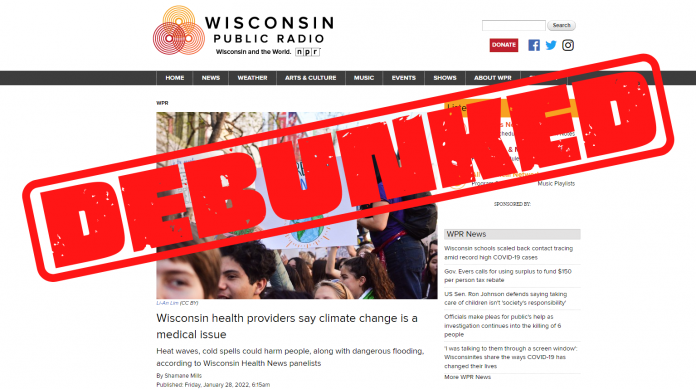A story run by Wisconsin Public Radio (WPR) today claims climate change poses a threat to human health. Disease and mortality data show this is false. During the recent period of modest warming, deaths resulting from extreme heat and weather have declined sharply, and research indicates climate change is not contributing to pandemics or parasite borne diseases.
WPR’s story, titled “Wisconsin health providers say climate change is a medical issue,” features input from the climate activist group, Wisconsin Health Professionals for Climate Action. WPR writes:
“Heat waves, cold spells could harm people, along with dangerous flooding, according to Wisconsin Health News panelists. Last year, top medical journals warned that climate change, not COVID-19, was the greatest threat to public health.”
“In the Midwest, climate change is likely to bring extreme temperatures and flooding, along with more mosquito and tick diseases, according to the Centers for Disease Control and Prevention (CDCP).”
While many top medical journals and the politically controlled CDCP have claimed climate change is causing worsening health and increasing incidences of premature mortality, hard data presented in peer reviewed literature proves this is false.
Data from the U.N. Intergovernmental Panel on Climate Change and the National Oceanic and Atmospheric Administration presented in Climate at a Glance articles disprove claims that heat waves, cold spells, and incidences of flooding have increased during the recent period of modern warming.
If instances of extreme heat or cold, and flooding events aren’t increasing, or are in fact declining, they can’t be causing an increase in adverse health events, which is precisely what the data establish.
As detailed in Climate Realism, here, deaths resulting from climate related events have fallen to a historic low, having fallen by more than 99 percent over the past 100 years.
On July 1, 2021 The Lancet published what is arguably the largest study ever to examine excess mortality associated with temperature. The study’s authors, 68 scientists representing universities and research institutes in 33 countries spanning all regions of the world, came to two very clear conclusions: Cold temperatures contribute to far more deaths each year than warmer temperatures; and deaths associated with extreme temperatures, hot or cold, are declining.
This study confirms what research previously published in The Lancet, the Southern Medical Journal, and other outlets, has consistently shown: Cold is the biggest temperature related killer, not heat, and as he earth warms the number of deaths related to extreme temperatures is falling dramatically.
Also, contrary to the impression given in the WPR story, there is no evidence insect borne tropical diseases are expanding their range or sickening, or claiming the lives of greater numbers of people as the earth has warmed.
The vast body of scientific literature referenced in Chapter Seven of Climate Change Reconsideree II: Biological Impacts and Chapter Four of Climate Change Reconsidered II: Fossil Fuels fails find any link between global warming and the spread of Lyme disease, malaria, Dengue fever, West Nile virus, and other vector-borne diseases are either grossly overstated or outright false.
For example, a 2010 study in the peer-reviewed science journal Nature:
“[C]compared historical and contemporary maps of the range and incidence of malaria and found endemic/stable malaria is likely to have covered 58% of the world’s land surface around 1900 but only 30% by 2007. They report, ‘even more marked has been the decrease in prevalence within this greatly reduced range, with endemicity falling by one or more classes in over two-thirds of the current range of stable transmission.’ They write, ‘widespread claims that rising mean temperatures have already led to increases in worldwide malaria morbidity and mortality are largely at odds with observed decreasing global trends in both its endemicity and geographic extent.’”
Also, in a 2008 article in the Malaria Journal, Pasteur Institute of Paris professor Paul Reiter wrote:
“Simplistic reasoning on the future prevalence of malaria is ill-founded; malaria is not limited by climate in most temperate regions, nor in the tropics, and in nearly all cases, ‘new’ malaria at high altitudes is well below the maximum altitudinal limits for transmission, [continuing] future changes in climate may alter the prevalence and incidence of the disease, but obsessive emphasis on ‘global warming’ as a dominant parameter is indefensible; the principal determinants are linked to ecological and societal change, politics and economics.”
Despite numerous claims to the contrary, claims parroted by WPR without citing any hard evidence, human health is not being threatened by climate change. Indeed, on every health indicator: human lifespan, premature mortality, premature births, infant mortality, hospitalizations linked to extreme temperatures or weather events, hunger, and malnutrition, to name the most often discussed health indicators, humans are living better, longer, healthier, lives than ever before.



















[…] Read the Full Article […]
[…] https://climaterealism.com/2022/01/relax-wisconsin-public-radio-climate-change-isnt-making-human-hea… […]
Ho hum…. more ‘could’ & ‘likely’, the words alarmists use to spread fear because their audience overlooks them when they hear the alarmists’ apocalyptic claims. They are a sure sign of total BS. The Earth ‘could’ get hit by a large asteroid….. There could be total nuclear war…